 W
W4MLinux is a lightweight Linux distribution made for both the 32 bit and 64 bit architectures. It is named "4MLinux" since it has 4 main components of the OS. Maintenance, Multimedia, Miniserver, and Mystery. The distribution is developed in Poland, and was first released in 2010. The distribution does not include a package manager, and uses JWM as its default window manager. It also comes with Conky preinstalled. When installing programs with the distribution, the distribution will retrieve the Windows version rather than the Linux version due to it coming pre-installed with Wine, and not having any package manager. The distribution is geared towards people who prefer a lightweight distribution. There is a version of the distribution called the "4MLinux Game Edition" which provides 90s games natively such as Doom, and Hexen.
 W
WAndroid is a mobile operating system based on a modified version of the Linux kernel and other open source software, designed primarily for touchscreen mobile devices such as smartphones and tablets. Android is developed by a consortium of developers known as the Open Handset Alliance and commercially sponsored by Google. It was unveiled in November 2007, with the first commercial Android device, the HTC Dream, being launched in September 2008.
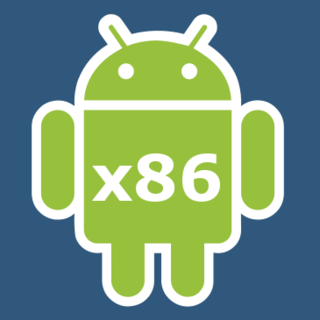 W
WAndroid-x86 is an open source project that makes an unofficial porting of the Android mobile operating system developed by the Open Handset Alliance to run on devices powered by x86 processors, rather than RISC-based ARM chips.
 W
WantiX is a Linux distribution based on Debian Stable. It is comparatively lightweight and suitable for older computers, while also providing cutting edge kernel and applications, as well as updates and additions via the apt-get package system and Debian-compatible repositories. Since version 19 it comes in two init system flavours: sysVinit and runit.
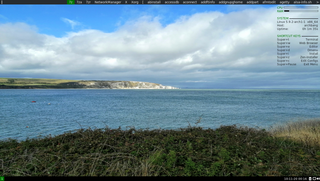 W
WArchBang Linux is a simple lightweight rolling release Linux distribution based on a minimal Arch Linux operating system with the i3 window manager, but was previously using the Openbox windows manager. ArchBang is especially suitable for high performance on old or low-end hardware with limited resources. ArchBang's aim is to provide a simple out-of-the-box Arch-based Linux distribution with a pre-configured i3 desktop suite, adhering to Arch principles.
 W
WArtix Linux, or Artix is a rolling-release distribution based on Arch Linux that uses OpenRC, runit or s6 init instead of systemd.
 W
WAustrumi is a bootable live CD Linux distribution. It is based on Slackware. It was created, and is currently being maintained by, a group of programmers from Latgale region of Latvia. The entire operating system and all the applications run from RAM, making AUSTRUMI faster than larger distros that must read from a disk, and allowing the boot medium to be removed after the operating system has booted.
 W
WCalculate Linux is a Linux distribution optimized for fast deployment in an organization environment. It is based on the Gentoo Linux project and includes many preconfigured functions.
 W
WChrome OS is a Gentoo Linux-based operating system designed by Google. It is derived from the free software Chromium OS and uses the Google Chrome web browser as its principal user interface. Unlike Chromium OS, Chrome OS is proprietary software.
 W
WChromium OS is a free and open-source operating system designed for running web applications and browsing the World Wide Web. It is the open-source version of Chrome OS, a Linux distribution made by Google.
 W
WCRUX is a lightweight, x86-64-optimized Linux distribution targeted at experienced Linux users and delivered by a tar.gz-based package system with BSD-style initscripts. It is not based on any other Linux distribution. It also utilizes a ports system to install and upgrade applications.
 W
WDamn Small Linux (DSL) is a computer operating system for the x86 family of personal computers. It is free and open-source software under the terms of the GNU GPL and other free and open source licenses. It was designed to run graphical user interface applications on older PC hardware, for example, machines with 486 and early Pentium microprocessors and very little random-access memory (RAM). DSL is a Live CD with a size of 50 megabytes (MB). What originally began as an experiment to see how much software could fit in 50 MB eventually became a full Linux distribution. It can be installed on storage media with small capacities, like bootable business cards, USB flash drives, various memory cards, and Zip drives.
 W
WDD-WRT is Linux-based firmware for wireless routers and access points. Originally designed for the Linksys WRT54G series, it now runs on a wide variety of models. DD-WRT is one of a handful of third-party firmware projects designed to replace manufacturer's original firmware with custom firmware offering additional features or functionality.
 W
WDevuan is a fork of Debian that uses sysvinit, runit or OpenRC instead of systemd. The Devuan development team aim to maintain compatibility with other init systems in the future and not detach Linux from other Unix systems.
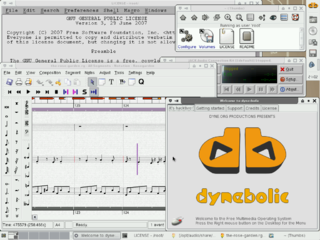 W
Wdyne:bolic GNU/Linux is a Live CD/DVD distribution based on the Linux kernel. It is shaped by the needs of media activists, artists and creators to be a practical tool with a focus on multimedia production, that delivers a large assortment of applications. It allows manipulation and broadcast of both sound and video with tools to record, edit, encode, and stream. In addition to multimedia specific programs, dyne:bolic also provides word processors and common desktop computing tools.
 W
WEndian Firewall is an open-source router, firewall and gateway security Linux distribution developed by the South Tyrolean company Endian. The product is available as either free software, commercial software with guaranteed support services, or as a hardware appliance.
 W
WThis is a list of Gentoo Linux derivatives.
 W
WGNU Guix System is a rolling release Linux distribution built around the GNU Guix package manager. It enables a declarative operating system configuration and allows reliable system upgrades that can easily be rolled back. It uses the GNU Shepherd init system and the Linux-libre kernel, with support for the GNU Hurd kernel under development. On February 3, 2015, the distribution was added to the Free Software Foundation's list of free Linux distributions.
 W
WGoboLinux is an open source operating system whose most prominent feature is a reorganization of the traditional Linux file system. Rather than following the Filesystem Hierarchy Standard like most Unix-like systems, each program in a GoboLinux system has its own subdirectory tree, where all of its files may be found. Thus, a program "Foo" has all of its specific files and libraries in /Programs/Foo, under the corresponding version of this program at hand. For example, the commonly known GCC compiler suite version 8.1.0, would reside under the directory /Programs/GCC/8.1.0.
 W
WIPFire is a hardened open source Linux distribution that primarily performs as a router and a firewall; a standalone firewall system with a web-based management console for configuration.
 W
WKNOPPIX is an operating system based on Debian designed to be run directly from a CD / DVD or a USB flash drive, one of the first of its kind for any operating system. Knoppix was developed by, and named after, Linux consultant Klaus Knopper. When starting a program, it is loaded from the removable medium and decompressed into a RAM drive. The decompression is transparent and on-the-fly.
 W
WKwort is a Linux distribution, based on CRUX. Kwort's desktop environment is Openbox.
 W
WLibreCMC is a Linux-libre distribution for computers with minimal resources, such as the Ben NanoNote, ath9k-based Wi-Fi routers, and other hardware with emphasis on free software. Based on OpenWrt, the project's goal is to aim for compliance with the GNU Free System Distribution Guidelines and ensure that the project continues to meet these requirements set forth by the Free Software Foundation (FSF). LibreCMC does not support ac or ax due to a lack of free chipsets.
 W
WLiMux was a project launched by the city of Munich in 2004 in order to migrate from Windows to a desktop infrastructure of its own, based on Linux. By 2012, the city had already migrated 12 600 of the total of 15 500 desktops, until in November 2017, the Munich City Council (Stadtrat) resolved to reverse the migration and return to Microsoft Windows-based software by 2020. In May 2020, it was reported that the newly elected politicians in Munich, while not going back to the original plan of migrating to LiMux wholesale, will prefer Free Software for future endeavours.
 W
WLineageOS is an operating system for smartphones, tablet computers, and set-top boxes, based on Android with mostly free and open-source software. It is the successor to the custom ROM CyanogenMod, from which it was forked in December 2016 when Cyanogen Inc. announced it was discontinuing development and shut down the infrastructure behind the project. Since Cyanogen Inc. retained the rights to the Cyanogen name, the project rebranded its fork as LineageOS.
 W
WMaemo is a software platform originally developed by Nokia, now developed by the community, for smartphones and Internet tablets. The platform comprises both the Maemo operating system and SDK. Maemo played a key role in Nokia's strategy to compete with Apple and Android, and that strategy failed for complex, institutional and strategic reasons.
 W
WMX Linux is a midweight Linux operating system based on Debian stable and using core antiX components, with additional software created or packaged by the MX community. It was developed as a cooperative venture between the antiX and former MEPIS communities. The community's stated goal is to produce "a family of operating systems that are designed to combine elegant and efficient desktops with high stability and solid performance". MX Linux uses the Xfce desktop environment as its flagship, to which it adds a freestanding KDE Plasma version and a Fluxbox implementation. Other environments can be added or are available as "spin-off" ISO images.
NanoLinux is an open source, free and very lightweight Linux distribution that requires only 14 MB of disk space including tiny versions of the most common desktop applications and several games. It is based on the Core version of the Tiny Core Linux distribution and uses Busybox, Nano-X instead of X.Org, FLTK 1.3.x as the default GUI toolkit, and SLWM. The included applications are mainly based on FLTK.
 W
WParted Magic is a commercial Linux distribution based on Slackware that comes with disk partitioning and data recovery tools. It is sold as a Linux-based bootable disk. The distribution's nomenclature is derived from the names of the GNU Parted and PartitionMagic software packages.
 W
WPCLinuxOS, often shortened to PCLOS, is an x86-64 Linux distribution, with KDE Plasma Desktop, MATE and XFCE as its default user interfaces. It is a primarily free software operating system for personal computers aimed at ease of use. It is considered a rolling release.
 W
WPentoo is a Live CD and Live USB designed for penetration testing and security assessment. Based on Gentoo Linux, Pentoo is provided both as 32 and 64-bit installable live CD. Pentoo is also available as an overlay for an existing Gentoo installation. It features packet injection patched Wi-Fi drivers, GPGPU cracking software, and many tools for penetration testing and security assessment. The Pentoo kernel includes grsecurity and PAX hardening and extra patches - with binaries compiled from a hardened toolchain with the latest nightly versions of some tools available.
 W
WPorteus is a portable operating system based on Slackware. It does not require installation and can be run from fixed and removable media, such as a USB flash drive or compact disc.
 W
WPostmarketOS is a free and open-source operating system under development primarily for smartphones, based on the Alpine Linux distribution.
 W
WPuppy Linux is an operating system and family of light-weight Linux distributions that focus on ease of use and minimal memory footprint. The entire system can be run from random-access memory with current versions generally taking up about 600 MB (64-bit), 300 MB (32-bit), allowing the boot medium to be removed after the operating system has started. Applications such as AbiWord, Gnumeric and MPlayer are included, along with a choice of lightweight web browsers and a utility for downloading other packages. The distribution was originally developed by Barry Kauler and other members of the community, until Kauler retired in 2013. The tool Woof can build a Puppy Linux distribution from the binary packages of other Linux distributions.
 W
WReplicant is a free operating system (OS) based on the Android mobile platform that aims to replace all proprietary Android components with free-software counterparts. It is available for several smartphones and tablet computers. It is written in the same programming languages as Android. The modifications are mostly in the C language; the changes are mostly to the lower-level parts of the OS, such as the Linux kernel and drivers that use it.
 W
WSalix OS is a multi-purpose Linux distribution based on Slackware.
 W
WSlackware is a Linux distribution created by Patrick Volkerding in 1993. Originally based on Softlanding Linux System, Slackware has been the basis for many other Linux distributions, most notably the first versions of SUSE Linux distributions, and is the oldest distribution that is still maintained.
 W
WSliTaz GNU/Linux is a lightweight Linux distribution, community-based, suitable for use on older hardware and as a Live CD or Live USB. SliTaz stands for "Simple, Light, Incredible, Temporary Autonomous Zone" according to the boot screen.
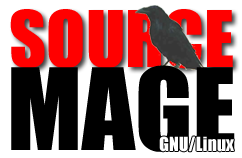 W
WSource Mage is a Linux distribution. As a package is being installed, its source code is automatically downloaded, compiled, and installed. Source Mage is descended from Sorcerer.
 W
WTiny Core Linux (TCL) is a minimal Linux kernel based operating system focusing on providing a base system using BusyBox and FLTK. It was developed by Robert Shingledecker, who was previously the lead developer of Damn Small Linux. The distribution is notable for its small size and minimalism; additional functions are provided by extensions. Tiny Core Linux is free and open-source software licensed under the GNU General Public License version 2.
 W
WVectorLinux, abbreviated VL, is a Linux distribution for the x86 platform based on the Slackware Linux distribution, originally developed by Canadian developers Robert S. Lange and Darell Stavem. Since version 7 the Standard Edition is also available for the x86-64 platform, known as VLocity64 7.
 W
WVoid Linux is an independent Linux distribution that uses the X Binary Package System (XBPS) package manager, which was designed and implemented from scratch, and the runit init system. Excluding binary kernel blobs, a base install is composed entirely of free software, but users can access an official non-free repository to install proprietary software.
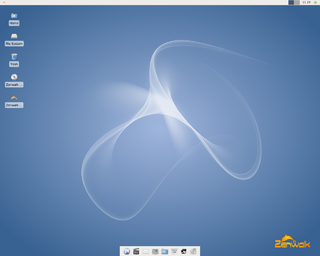 W
WZenwalk is a Desktop focused Linux distribution founded by Jean-Philippe Guillemin. It is based on Slackware with very few modifications at system level making it 100% compatible with it. Zenwalk aims to be a modern and multi-purpose Linux distribution by focusing on Internet applications, multimedia and programming tools. Additionally, Zenwalk comes with many specialized tools, designed for beginner through advanced users as it offers system configuration via both graphical and command-line operations.